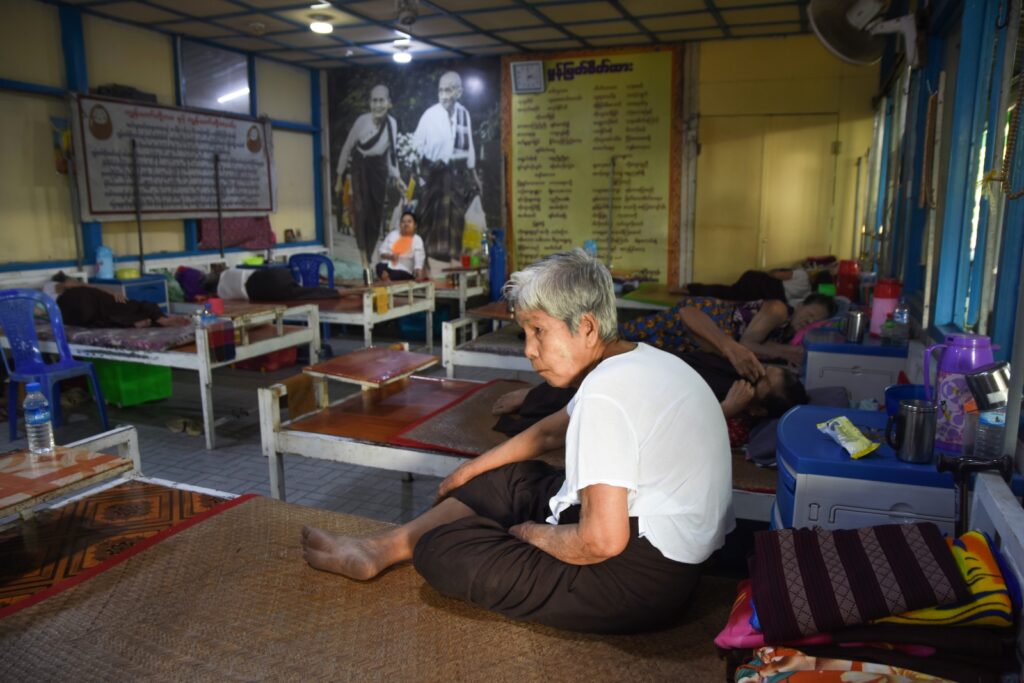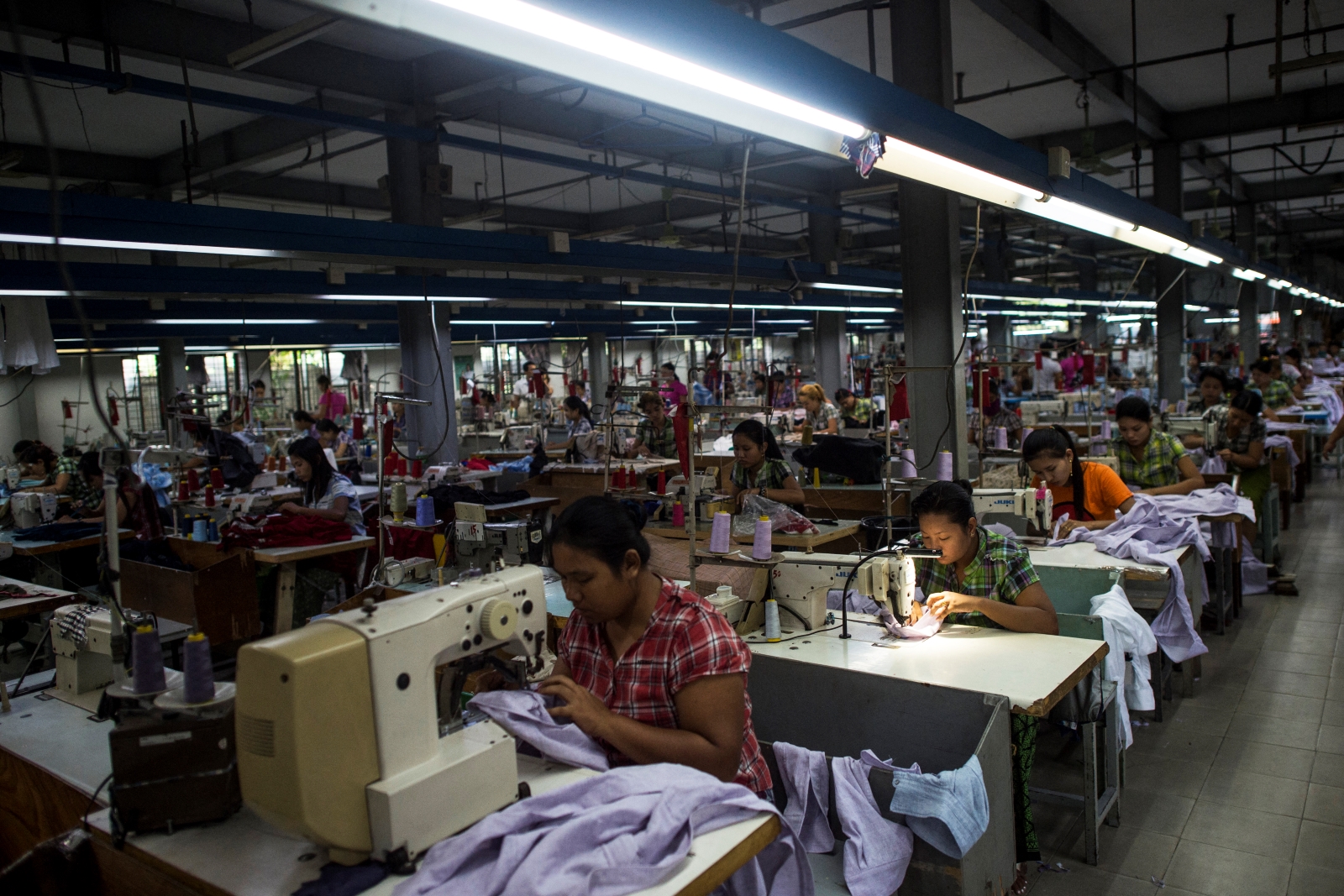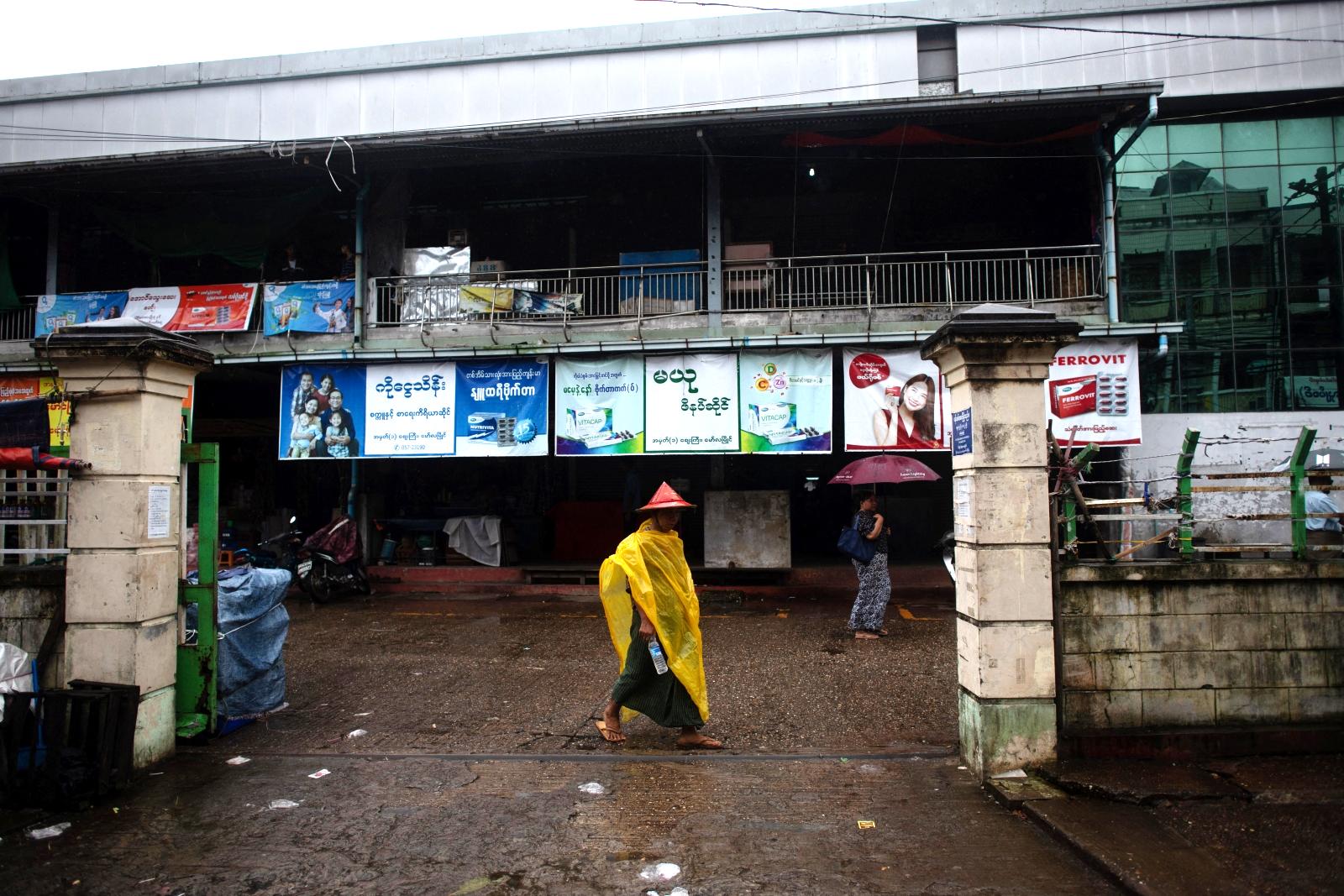Political turmoil and economic free-fall have pushed many elderly people onto the streets, with shelters struggling to cope as funding dries up and the regime largely ignores the problem.
By RACHEL MOON | FRONTIER
“I had only one child. I never expected he would kick me out of my home after I used all my energy to raise him on my own,” 88-year-old widow Daw Khin Hla lamented, sitting on an old sling chair at her dormitory in a home for the aged.
The skinny, fragile-looking woman used to live with her son in a small apartment in North Okkalapa Township, in Myanmar’s commercial capital Yangon. She was only in her 40s when her husband died and she had to continue raising the boy alone. She made a modest living selling vegetables at a market, but a lung disease stopped her from working about a decade ago.
Her son, now in his 50s, also used to make some money doing odd jobs in the neighbourhood, but he became increasingly aggressive as his alcoholism deepened over the years.
“He used to swear at me when he was drunk. He sometimes lost consciousness, and other times he beat me up,” Khin Hla said, wiping tears from her face.
Then, in September last year, the son threw her out of the apartment. She became homeless overnight, with bruises all over her body.
However, she refuses to blame him.
“When it became difficult to even earn enough money to eat, he got very frustrated. He was drinking all the time. Alcohol did that to me, not my son. Now I don’t know where he is because we’ve lost contact,” she said.
Neighbours took care of her for a few days, but they soon found her a place at the Monmyat Seikhtar Home for the Aged, also in North Okkalapa, after one of its residents died.
“Grandma Khin Hla was very lucky. It’s very rare to enter the shelter just after submitting the [application] form. When she arrived, we had to treat the injuries her son had inflicted on her and the pneumonia she was suffering,” Daw Tin Tin Win, general secretary of the shelter, told Frontier in early January, adding that there were 15 people waiting to be accepted.
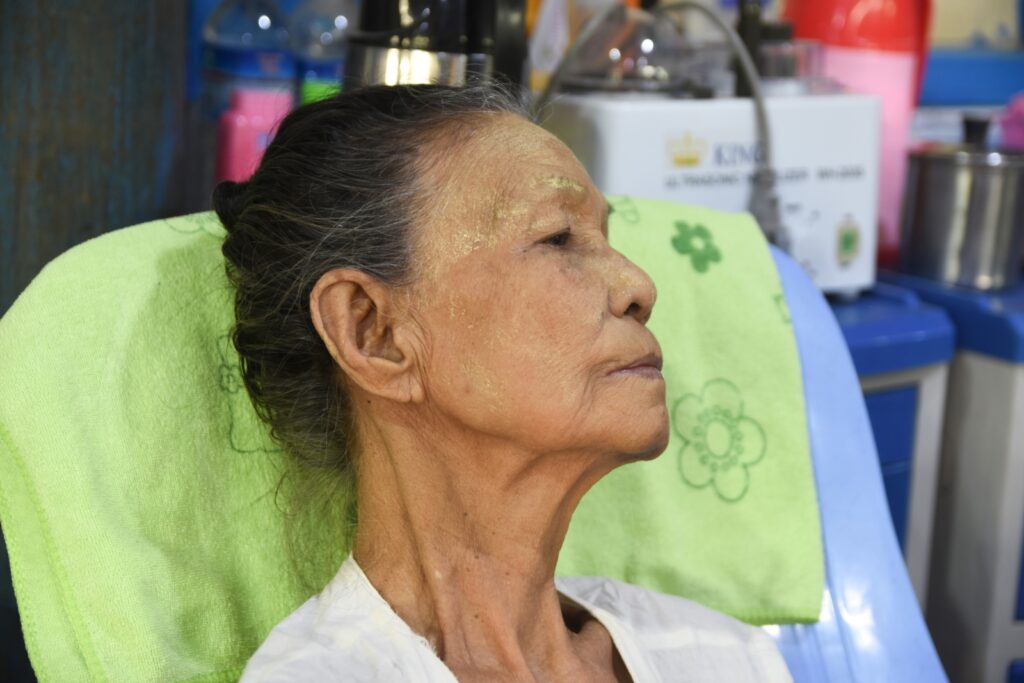
Most other homes for the aged in the city are also unable to meet demand, according to Ko Kyaw Kyaw*, a Yangon-based volunteer who asked that the name of his organisation be withheld.
“The number of elderly people asking for help is increasing every month. We provide financial support and try to find shelters for them, but we can’t help all of them because the number of requests is too high,” he told Frontier.
Although humanitarian organisations record levels of displacement by armed conflict in Myanmar, there are no figures for people made homeless for other reasons. However, staff at shelters such as Monmyat Seikhtar and social-welfare volunteers like Kyaw Kyaw said the numbers of elderly people seeking assistance have steadily increased since the 2021 coup.
Besides triggering armed conflict over large parts of the country, the coup has also put the economy in free-fall, condemning millions of people to poverty even in more stable areas like Yangon. The World Bank says consumer prices increased 29 percent in the twelve months preceding June last year, while 40pc of households reported earning less than the previous year.
Because most shelters are full, many elderly people can be seen sleeping rough on the streets of Yangon. One of them is 71-year-old Daw Mya Kyi, who Frontier found living in Hledan Market in Kamaryut Township while she waited to be accepted by a shelter.
Mya Kyi used to live with her mother, who died six years ago, in a small, rented room near the market, where she earned some money until the work dried up.
“Shop owners used to give me jobs like cleaning or washing dishes. But now I’m old enough to be their grandma, no one wants to hire me anymore. I can no longer afford the rent, so I have nowhere to live,” she told Frontier.
Mya Kyi lost her room over a year ago, and now that she’s homeless she sleeps some nights in the market and others at Buddhist monasteries and prayer halls. Three months ago, a group of volunteers found her and offered to help find her permanent accommodation.
“A few young men came and asked me if I wanted to live in a shelter. Of course I want to live and sleep in a warm house. They got recommendation letters from the ward administration office, but several days later they told me I needed to wait a few months because all the shelters were full,” she said.
The volunteers gave Mya Kyi some money and a weighing machine so she could earn something while she waited. Now she charges K100 to passers-by who want to know their weight.
“I sit every day with the weighing machine near Hledan Junction and return to the market at night to sleep on the table of a shop. I used to often go and sleep in monasteries, but I haven’t moved from here since those volunteers visited me, because I’m afraid they won’t find me when I’m accepted by a shelter,” she said.
Mya Kyi hasn’t heard anything from the volunteers since they gave her the weighing machine, but she still has hope. “I hope one day these kids will come back to me and send me to a warm shelter,” she said.
State neglect
The last census, conducted in 2014, counted about 4.5 million people aged 60 and older, but the only safety net available to the elderly is a state pension of just K10,000 a month (about US$3 at the market rate) for those aged over 85.
The pensions started in 2017 under the National League for Democracy government, which was ousted by the 2021 coup, and the junta has since continued the scheme. The regime’s Department of Social Welfare says it distributed K20.3 billion to 206,887 elderly people in the 2022-2023 fiscal year, ending in March, but many appear to have been left out.
Naw Maysi*, a resident of Yangon’s North Dagon Township, told Frontier that her 86-year-old mother has yet to receive the pension and local officials have never visited her home.
“From what I know, the ward administration office has to submit the details of the elderly person to the social welfare department, not us. The department then distributes the money through the ward office,” she said. “However, when I asked one of the officials about this, he just said that those who received the pension before the coup are still receiving the money. He said he didn’t know anything about those who qualified after that.”
Frontier called Daw San San Aye, director general of the Department of Social Welfare, but she hung up the phone before answering our questions about the pension scheme.
The department doesn’t run its own homes for the elderly but its website says it provides 58 private shelters with financial and technical assistance. However, none of the three institutions contacted by Frontier said they had received such support.
Monmyat Seikhtar general secretary Tin Tin Win complained that, besides this lack of assistance for providing an essential public service, the home has to pay taxes because it was built on government-owned land.
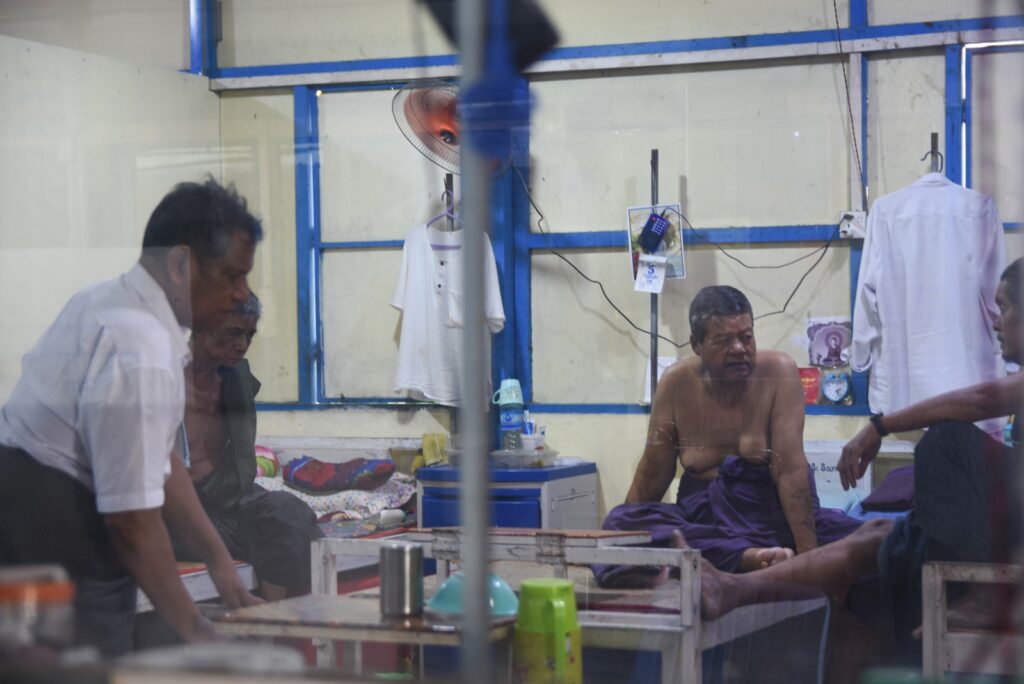
She added that being a state tenant meant they could also be evicted at a moment’s notice, if the regime wanted to use the land for its own purposes. Because of this risk, they didn’t dare to build an extension to the shelter, despite being unable to meet demand.
“We want to expand our building, but we can’t. Right now, we can only give shelter to 25 people. We want to accept more but don’t have the space,” she said.
Moreover, the junta is harassing shelters established by political dissidents. These include a home for the aged in Ayeyarwady Region whose name has been withheld for security reasons. It was founded in 2015 by a teacher who joined the Civil Disobedience Movement after the coup. When the junta issued a warrant for her arrest in March 2021, she fled to an area controlled by a resistance army and has not returned.
Daw Zin Zin Thu*, who now runs the shelter, told Frontier that its bank account was frozen when the founder’s arrest warrant was issued. “There was about K2 billion in the account, but we still don’t have any access to that money. Since then we’ve struggled due to a lack of funds. We just manage to get by on new donations and by selling ngapi [a fish paste] and dried fish online,” she said.
However, Zin Zin Thu said donations have dwindled while costs have risen due to inflation.
“Before the COVID-19 pandemic and the coup, we used to spend between K9 and K10 million each month. Now our expenses have risen to about K14 million. Meanwhile, donations have decreased from around K10 million a month to between K4 and K8 million,” she said.
The level of service has suffered due to the resulting need to cut costs. “Before, we could change our elderly people’s diapers three times a day, but now we can only change them twice,” she said, adding that the shelter has to turn down about 10 people every month.
To make matters worse, the shelter is operating in a legal limbo, because the township administration office refused to renew its registration when it ended in 2022.
“They told us they couldn’t accept our application [to renew] because our founder is taking part in the political movement against the regime. We have kept working without proper registration, but nobody has disturbed us so far because everybody knows we’re taking care of unhealthy older people,” Zin Zin Thu said.
Meanwhile, other shelters have had to close down due to a lack of funds.
In December, U Thein Lwin had to leave the shelter where he had lived for six years in Mon State’s Thanbyuzayat Township because donations for the institution had plummeted.
“There were around 18 old people there. They left one by one because there were no funds. Sometimes we didn’t even know if we’d get food. Three people died recently at the shelter because there was no healthcare,” the 70-year-old said.
Thein Lwin lives now in the Monmyat Seikhtar shelter in Yangon, but he worries about his future.
“I want to stay peacefully here until I die,” he said. “I don’t want to move again because the home can no longer feed me.”
* indicates the use of a pseudonym for security reasons


